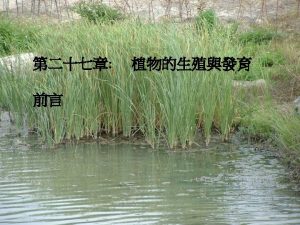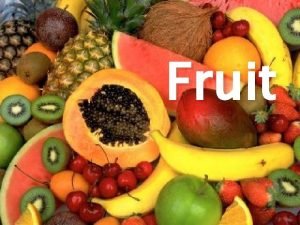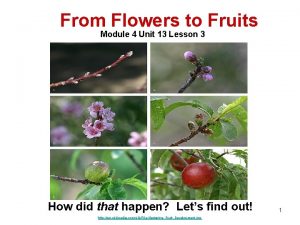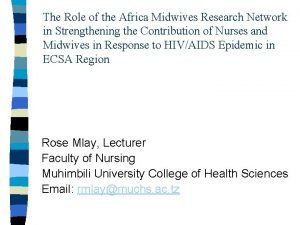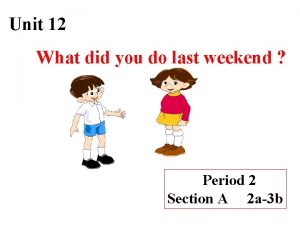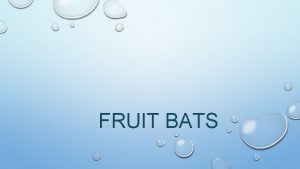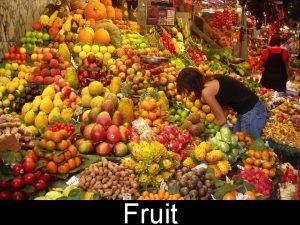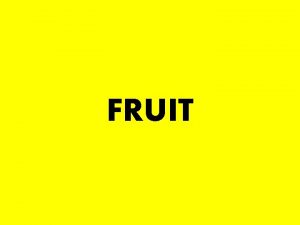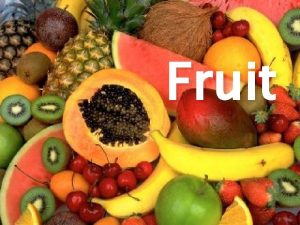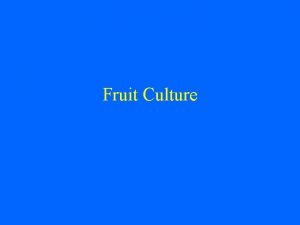Fruit Research at icipe Sunday Ekesi African fruit














- Slides: 14

Fruit Research at icipe Sunday Ekesi African fruit fly programme Interest Group Meeting on High Value Fruits Research, Nairobi, 06. 07

Fruit Research at icipe – Presentation outline q Background to on-going research activity on fruit q One relevant research activity and gaps to be filled q Relevance to CGIAR System Priorities q Critical need for new collaboration q Potential for funding and strategy

Fruit Research at icipe q Target crops: mango, citrus, banana, papaya & passion fruit q Constraints: § Production system – Insect pests & disease diagnosis, IPM, technology transfer, Natural Resource Management § Germplasm conservation/ evaluation/ exchange (collection & compilation) § Breeding for preferred end user traits: markers for biotic and abiotic stress § Post harvest handling, storage and processing § Invasion and problems of phytosanitary management § Marketing § Databasing/ information exchange

Fruit Research at icipe q 1999 -2007: African Fruit Flies Initiative (AFFI) – Donor (IFAD) - Target crop: Mango, limited activities on citrus, banana, papaya - Target countries (Core operations: Kenya, Tanzania, Uganda) q 2007 -2010: Mango IPM project – Donor (BMZ) - Target countries (Benin, Kenya & Tanzania) q Relevant to CGIAR system priority 3 A: - Increasing income from fruits and vegetables

African Fruit Flies Initiative IFAD: 1999 -2007 Accomplishments q Extensive programme network established (10 African countries) q Food baits and traps developed for monitoring and suppression African Fruit Fly Initiative (Reseau Africain de la Mouche de Fruits) q Entomopathogenic fungi developed (undergoing registration) q Exotic parasitoids introduced & native ones shipped to partners q IPM package (bait, fungus and orchard sanitation) field tested q Quarantine sensitive tools developed and disseminated to NPPOs q Capacity building – training of Ph. Ds & MScs

Major Research Gaps – AFFI IFAD mango q Other insect pests (outside fruit flies) and disease problems - need for an IPM approach targeting all pests & diseases q Post harvest treatment, storage, processing technologies and value addition q Classical biological control targeting invasive pest species q Pilot production facility for bio-pesticides and attractants/baits to meet large scale application by farmers q Monitoring tools and phytosanitary systems to guard against invasive pest species, e. g. expanding invasive pest complex on major fruits

Major Research Gaps – AFFI IFAD mango q NRM practices – water and nutrient management requirements, low cost irrigation technologies q Low supply of improved mango varieties with preferred end use traits (pest/disease resistance, high yield, non-fibrous, post harvest quality etc) q Linking farmers to market and information systems q Regulatory framework, certification, policy dialogue q Capacity building at various levels of competencies q Awareness campaigns on nutritional values of fruits

Mango IPM BMZ: 2007 -2010 Activities q Elucidate the biology and ecology of target pests q Assess the role of indigenous and exotic natural enemies q Develop new technologies suitable for smallholder q Identified and tested exotic natural enemies q Assemble, validate and implement IPM package Top right: Bactrocera invadens Top left: Sternochetus mangiferae Down: Rastrococcus iceryoides q Link farmers to market & processing information

Critical needs for new collaborative research q Post harvest § Develop parameters, best-bet innovations § Low cost processing, packaging, storing and shipment q Bio-pesticides and attractants/baits for pests § Formulation techniques, § Cost-effective production methods, registration/commercialization q Diseases management § Collaborate with experts in other institutions q Integration of fruits into farming system § Systems agronomists in specialist CGIAR centres

Critical needs for new collaborative research q Market efficiency and entrepreneurial development § Market intelligence & information systems § Smallholder linkages to market q Germplasm conservation/ availability/ exchange/ propagation § Conservation § Priority crops for propagation, stress reaction § Seed/ planting material sanitation and micro-propagation q Irrigation § Low cost technologies, micro-irrigation, fertigation q Need to expand research to citrus, banana, papaya & passion fruit

Funding needs & strategy q Relates largely to research gaps listed earlier q Current traditional donors of icipe: § IFAD, BMZ, USAID q Global. Hort q FAO/WHO Fruits and Vegetable Initiative q USAID Horticulture CRSP q Alignment with CP on HVC q Need to expand operations to other countries

Lessons from the various research activities q There is the need for understanding the synergy between different development partners – limit undue research fragmentation q Single bullet management approach is inefficient q Interventions should be geared towards compliance with export market (also help boost domestic urban market) q Standards required for export market increase adoption of new technologies q Stringent market requirements (certification) threatens smallholders q Certain management packages are expensive for smallholder (need for local product development)

Lessons from the various research activities q Need to link farmers to marketing channels q Access to improve varieties q Organise farmers into functional working group to help technology diffusion q Poor phytosanitary management skill threatens invasion by alien pests q Need for tools and extension materials to support technology dissemination q Promote awareness on nutritional value of fruits

Thank you!
 Microspore megaspore
Microspore megaspore Sunday bloody sunday guitar lesson
Sunday bloody sunday guitar lesson Trinity activities for sunday school
Trinity activities for sunday school Fruit and vegetables meaning
Fruit and vegetables meaning How does a fruit form
How does a fruit form Partes de una planta
Partes de una planta Africa midwives research network
Africa midwives research network Our sunday morning
Our sunday morning Ii. the gipsy (magna), 2008
Ii. the gipsy (magna), 2008 Write about your last weekend
Write about your last weekend Trinity sunday year c
Trinity sunday year c Third sunday of easter year c
Third sunday of easter year c Sunday evening prayer
Sunday evening prayer Monday evening prayers
Monday evening prayers Sunday action
Sunday action
